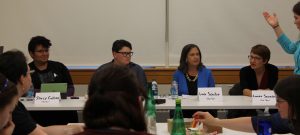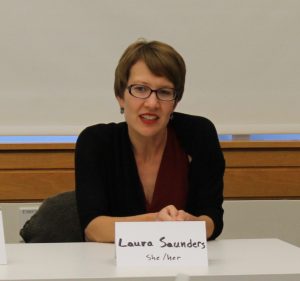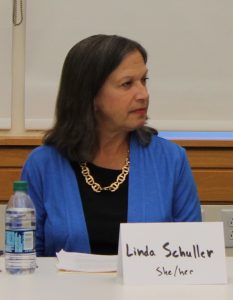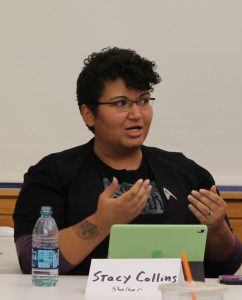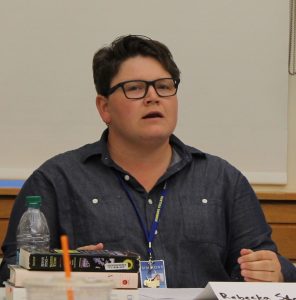Written by Kimberly Arleth:
Fall is in full swing and once again Banned Books Week is here. What better way to kick off the celebration of Banned Books week at Simmons College, than a discussion on censorship, intellectual freedom and banned books!
On Monday night, a panel made up of Stacey Collins (Beatley Librarian), Laura Saunders (Assistant Professor at SLIS), Rebecka Scheffield Senior Lecturer at SLIS), and Linda Schuller (Beatley Librarian) lead this discussion for a full audience of SLIS students.
The conversation began with our panelists discussing their worth with and interest in Intellectual Freedom and Censorship. This covered a wide range of the library and archive professions; including children and young adult book publication and diversity of voices, professional reactions to challenges, censorship’s effect on the modern Gay Rights Movements, and understanding the motivations of those who challenge books.
While a wide range of ground was covered during the event, a few key themes came up again and again.
- Remember that these conversations may not lead you to having all the answers, they are not supposed to. But these conversations are meant to make you start think about these issues, challenge motivations, the need for diversity and your own habits of staying in an echo chamber of like ideas.
- POLICY, POLICY, POLICY. Be sure to create a policy BEFORE you experience a challenge to collection material. This will not only give guidelines for you as a librarian but it also gives a legitimacy to the challengers concerns.
- Likely, be sure to treat a challenger with respect regardless if the complaint is one you disagree with. These individuals are operating out of some sense of fear; a fear of an unknown, a fear of societal anxieties, etc.
- While challengers may be some of the louder voices, remember the communities we serve are not just one group – but multiple groups we are responsible for providing material for. Don’t be quick to remove materials but again quality policies help to curb this.
- Remember what the Library mission is, how we are working to reach that end both in collection development but also in response to challenges.
- Maintain sense of self awareness. What is your role in helping the library to achieve its Mission? Remember, Not only are there external forces posing censorship but we also can be subjected to self-censorship – which can be combated by self-reflection.
- Censorship is not just parents concern over children’s book. It happens at the publisher level too by eliminating voices before they even get to the general public. This is a place that librarians can have a powerful impact by rewarding the publishers that provide us with the diversity of voices and stories our constituents are looking for.
- From an archival perspective, censorship is more often unintentional internal force. When not processing particular collections due to size, delicacy, funding issues, etc. It results in stories we don’t even know are there never making it to the surface.
As the audience took in these points, the next obvious question was what can we do as students and early professionals work to combat censorship and better engage with Intellectual Freedom. A consensus among our panelists spoke to reaching outside of your own comfort zone. Be aware of what voices you listen to, what you take in and try to maintain a pulse on the current issues. The work of maintaining self-awareness is the flip of our own self-censorship and it will also prepare you for handling challenges to your collections calmly and professionally.
Though not all of the conversation was heavy. Closing out the night the discussion turned to the favorite band books of both panelists and members of the audience.
Finally, I want to leave you with a list of the resources our panelists referenced as a starting point for staying abreast on conversations in the field, particularly on issues of censorship, intellectual freedom, and diversity.
- Critical Librarianship, website (http://critlib.org/) and follow their hashtag on Twitter: #CritLib
- In the Library with the Led Pipe (http://www.inthelibrarywiththeleadpipe.org/) – “an open access, open peer reviewed journal founded and run by an international team of librarians working in various types of libraries. In addition to publishing articles and editorials by Editorial Board members, Lead Pipe publishes articles by authors representing diverse perspectives including educators, administrators, library support staff, technologists, and community members.” (from In the Library with the Led Pipe website)
- Feral Librarian (https://chrisbourg.wordpress.com/)– Blog of Chris Bourg, Director of Libraries at MIT. Bourg describes her blog focus as “I like to write about libraries, scholarly publishing, social justice issues, sports, and music.” In addition, Bourg has published on Feminism and Diversity in the Library, Open
- ALA Office of Intellectual Freedom (http://www.ala.org/offices/oif)- Has a list of various resources that students should check out – including the Intellectual Freedom Blog (http://www.oif.ala.org/oif/).
Thank you so much for all our panelists and audience for helping us kick-off this years’ Banned Books Week! If you wanted to attend the panel but were unable to do so, you can check out the recording here. Also follow the conversation on twitter using the hashtag #slisbannedbooks.
Some photos from the event:
